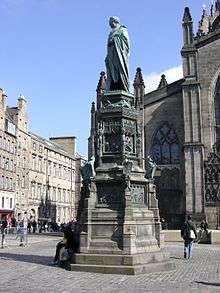William Birnie Rhind

William Birnie Rhind RSA (1853–1933) was a Scottish sculptor. Rhind was born in Edinburgh as the eldest son of sculptor John Rhind (1828–1892), and the elder brother of J. Massey Rhind. The two brothers set up a studio in Glasgow in 1885, then Birnie moved to Edinburgh, and his brother went to Paris, then permanently to America in 1889, despite the warnings of their father. His younger brother was Thomas Duncan Rhind the architect.
His name is particularly connected to several dozen fine sculptural war memorials in the Edinburgh and Lothian area. The best of these is the hauntingly calm monument to the Royal Scots Greys on Princes Street in Edinburgh. Also of poignant note is the 1919 bronze figure of a fallen officer, telling his men to "carry on", which acts as the school war memorial at Fettes College, a private school in Edinburgh.
William is buried with his parents, and Alice Stone, his wife, in the family plot in Warriston Cemetery in North Edinburgh towards the south end of the original cemetery, facing a main path.
Architectural sculpture
| Wikimedia Commons has media related to William Birnie Rhind. |
- "Virtue" panels on the memorial to the Duke of Buccleuch in front of St. Giles Cathedral, Edinburgh, 1887
- Allegorical figures on Charing Cross Mansions, Glasgow, 1889–1891
- The Main Entrance Archway, West Ham Technical College, 1898
- Pulpit and font at St Mary's Collegiate Church, Haddington 1891
- Apollo Group, sculpture on the former Sun Life Building, Glasgow, 1889–1894
- Figures of angels and apostles inside Bellevue Reformed Baptist Church, East London Street, Edinburgh, 1894
- Pair of statues to Thomas and Peter Coats in Paisley, 1895
- Monument to Lord Belhaven and Stenton, Dean Cemetery, Edinburgh, 1896
- The seated figure of Science on the Kelvingrove Art Gallery and Museum, 1898
- Figures in niches on the Scottish National Portrait Gallery, Edinburgh, 1898
- Sculptural figures on a large memorial in Roslin churchyard, 1899
- Bronze portrait head of Dr James Cappie (1829-1899) in Grange Cemetery, Edinburgh (1899)
- Allegorical figures on the Scotsman Building, Edinburgh, 1900 (above North Bridge Arcade)
- Figures and panel on the former National Bank of Scotland branch, Glasgow, 1902–1903
- Last Supper panel within St Pauls Church, Lorne Street, Leith, 1903
- Monument to Sir Hector MacDonald, Dean Cemetery, Edinburgh, 1904
- The River Mersey, Navigation, and Commerce, with sculptor Edward O. Griffith, formerly on the Liverpool Cotton Exchange, 1905–1906
- Frieze within the old Lothian Region Chambers on George IV Bridge in Edinburgh, 1905
- Heads on corbels, Corstorphine Old Parish Church, Edinburgh, 1905
- Science on the Armstrong Building, Newcastle, 1906
- Monument to the King's Own Scottish Borderers on North Bridge, Edinburgh, 1906
- Monument of horse and rider to the Royal Scots Greys on Princes Street, Edinburgh, 1906
- Figures on the former R. W. Forsyth Department Store (corner of Princes Street and St. Andrew Street, Edinburgh, 1906
- Figure of St.Andrew on St. Andrew's Parish Church, North Berwick, 1907
- Monument to the Black Watch for the South African War (Boer War), The Mound, Edinburgh, 1908
- Monument to the poet Robert Burns, Montrose 1912
- Ashton Building at the University of Liverpool, 1912–1914
- City Arms on the Usher Hall, Edinburgh, 1914
- Four allegorical groupings — representing Agriculture, Art, Industry and Learning — at the base of the dome of the Manitoba Legislative Building, Winnipeg, 1918-1919
- Buckie War Memorial (1921)
References
- "William Birnie Rhind". Dictionary of Scottish Architects.
- McWilliam, Colin; Gifford, John; Walker, David (1984). Edinburgh. The Buildings of Scotland. Yale. ISBN 0-300-09672-0.
- McWilliam, Colin (1978). Lothian, except Edinburgh. Buildings of Scotland. Yale. ISBN 0-300-09626-7.